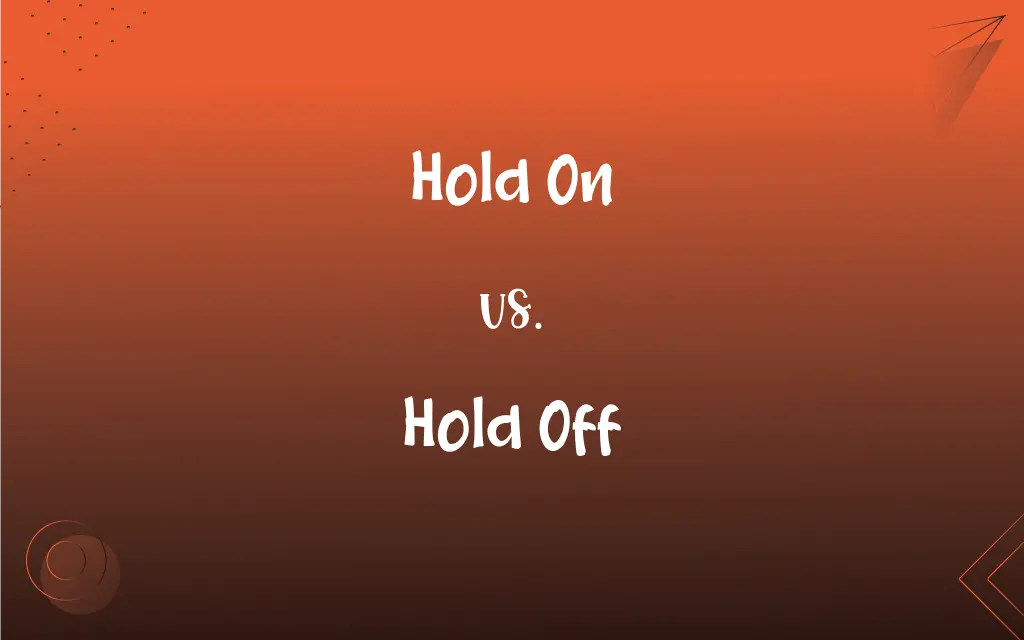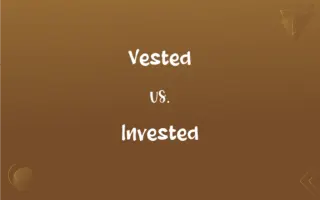Hold On vs. Hold Off: What's the Difference?
Edited by Harlon Moss || By Janet White || Published on December 12, 2023
"Hold on" means to wait or maintain a position, whereas "hold off" means to delay or postpone something.

Key Differences
"Hold on" is commonly used to request someone to wait or pause for a brief period. It suggests momentarily stopping an action or maintaining the current state. In contrast, "hold off" implies delaying or deferring an action or decision. It suggests postponing something until a later time or until certain conditions are met.
In a conversation, "hold on" might be used to ask someone to wait while the speaker is busy or needs time to think. It can also mean physically gripping something firmly. "Hold off," on the other hand, often refers to delaying actions or decisions, such as holding off on making a purchase or starting a project.
"Hold on" can also convey the idea of enduring or persisting through a challenge. For example, holding on during tough times. "Hold off" might be used strategically, like holding off on giving an opinion until more information is available.
In an emergency, "hold on" can be a directive to maintain safety or stability, such as holding on to a railing during turbulence. "Hold off" in a similar context could mean delaying an action for safety reasons, like holding off on an outdoor event due to bad weather.
In terms of emotional context, "hold on" can express hope or perseverance, encouraging someone to stay strong. Conversely, "hold off" can imply caution or restraint, advising someone to wait for a better time or opportunity.
ADVERTISEMENT
Comparison Chart
Basic Meaning
To wait or maintain position
To delay or postpone
Context of Use
Requesting someone to pause or grip something
Advising to delay actions or decisions
Connotation
Persistence, enduring, or pausing
Caution, restraint, or strategic delay
Typical Usage in Conversation
Asking for a brief wait or maintaining grip
Suggesting postponement until a later time
Emotional Implication
Hope, perseverance
Caution, waiting for a better opportunity
ADVERTISEMENT
Hold On and Hold Off Definitions
Hold On
To wait or pause momentarily.
Hold on, I'll check the schedule and let you know.
Hold Off
To delay action as a strategic decision.
The coach told the team to hold off on their offensive play.
Hold On
To grasp something tightly.
Hold on to the handrail while going downstairs.
Hold Off
To refrain from doing something.
I'll hold off on commenting until I know more.
Hold On
To keep a telephone line open.
Could you hold on while I transfer your call?
Hold Off
To postpone or delay something.
We decided to hold off the meeting until next week.
Hold On
To endure or persist.
We just need to hold on until help arrives.
Hold Off
To keep something at bay or not start immediately.
Hold off on starting dinner; I'm running late.
Hold On
To maintain a position or opinion.
I'll hold on to my beliefs, regardless of the pressure.
Hold Off
To wait for a better opportunity or condition.
Let's hold off buying a car until the new models come out.
FAQs
What does it mean to tell someone to hold on?
It means asking them to wait or pause for a moment.
How is hold off used in planning?
It suggests delaying a plan or decision until later.
What does hold off imply in a business context?
It implies waiting before making a business decision.
Is hold on appropriate in urgent situations?
Yes, especially to maintain safety or attention.
Can hold on express emotional support?
Yes, it can convey encouragement to persevere.
Can hold on be used in a physical context?
Yes, like gripping something firmly for safety.
How does hold off relate to time management?
It involves strategically delaying actions for better timing.
What’s a common use of hold on in conversations?
Asking someone to wait while you complete a task.
Can hold on be used in a motivational context?
Yes, like encouraging someone to keep going.
Is hold off often used in financial advice?
Yes, like advising to delay a purchase or investment.
What does hold off mean in sports strategies?
It means delaying a play or action strategically.
Is hold off appropriate when more information is needed?
Yes, it's used to delay decisions until having more details.
What does hold on mean in a safety instruction?
It means to keep a secure grip or position for safety.
What does hold off mean in environmental strategies?
It suggests delaying actions to assess environmental impact.
How does hold off apply in risk management?
It's used to delay actions until risks are lower.
Does hold on indicate a short or long wait?
Usually, it suggests a short, temporary wait.
How does hold off work in diplomatic contexts?
It implies waiting before taking a diplomatic action.
Can hold on be used to maintain a current state?
Yes, like keeping a current stance or position.
How is hold on used in telephone communication?
Asking the caller to stay on the line briefly.
Can hold off indicate caution in decision-making?
Yes, it can imply waiting for a safer or better option.
About Author
Written by
Janet WhiteJanet White has been an esteemed writer and blogger for Difference Wiki. Holding a Master's degree in Science and Medical Journalism from the prestigious Boston University, she has consistently demonstrated her expertise and passion for her field. When she's not immersed in her work, Janet relishes her time exercising, delving into a good book, and cherishing moments with friends and family.
Edited by
Harlon MossHarlon is a seasoned quality moderator and accomplished content writer for Difference Wiki. An alumnus of the prestigious University of California, he earned his degree in Computer Science. Leveraging his academic background, Harlon brings a meticulous and informed perspective to his work, ensuring content accuracy and excellence.

































































